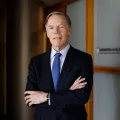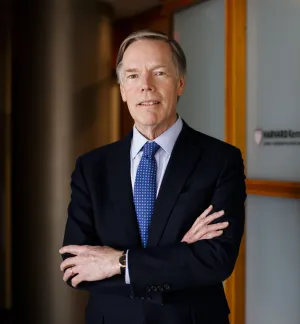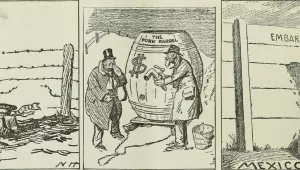FROM THE START of his presidency, Barack Obama has demonstrated noticeable diplomatic dexterity in dealing with some of America's most difficult adversaries. Without much fanfare, he sent American diplomats to Damascus to open a serious channel to the Asad regime for the first time in four years. He followed that up by surprising the ayatollahs in Tehran by going above their heads in sending an effective video message of reconciliation to the Iranian people. And Secretary of State Hillary Clinton encouraged Iranian participation in a United Nations meeting on Afghanistan earlier this week.
These are modest steps to start anew with two regimes that will no doubt continue to be thorns in America's side. But, by unclenching America's own fist, Obama has subtly changed the terms of debate in the Middle East. Leading with diplomacy has put America on the offensive again and reclaimed some badly needed credibility for the more daunting tests in the months to come. The tortuous issues of war and division in the Middle East are far from being resolved, of course, and there are Olympian hurdles ahead for Obama and his team. But, they are off to a fast and sure start in negotiating the treacherous waters of the Middle East.
That is why it is ironic that Obama may be finding it far more difficult to deal with another group of countries this week - our best friends in Europe. Obama is facing perhaps his most challenging meetings on the international stage this year at the G20 gathering in London and NATO's 60th anniversary Summit in Strasbourg. The United States needs to convince our 24 European allies to help us confront three serious global problems: developing an effective international economic recovery plan; finding a way to deal more successfully with a resurgent and dyspeptic Russia; and agreeing on a much stronger European effort in Afghanistan.
It is proving to be rough sledding on all fronts - in part because of divisions within Europe itself. Washington wants European governments to bolster their relatively modest stimulus packages so that less of the burden for the economic rescue falls on the American taxpayer. Most of the European leaders, led by Germany's Angela Merkel and France's Nicolas Sarkozy, are resisting, preferring instead to hold out for much tighter regulation of the international financial markets. The Europeans are also squabbling among themselves over whether or not to rescue rapidly sinking economies in the formerly communist, eastern half of the continent. The refusal of the Germans, French, and others to bail out the Hungarians and Latvians caused a bitter rupture last month. The danger is that this risks diluting the historic unity between Europe's east and west that marked the end of the Cold War - arguably among the greatest European-American achievements in a century.
A similar east-west divide has paralyzed the debate over how to handle Russia. Most western European governments are rushing to make up with Vladimir Putin by deemphasizing the Russian invasion of Georgia last August and the bullying by Moscow of NATO ally (and former Soviet republic) Estonia. Most eastern European governments, by contrast, fear a return to Moscow's heavy-handed, imperial influence, which they remember all too vividly from the Cold War. Wednesday's news that Obama and Russian President Dmitri Medvedev agreed to a "fresh start" in US-Russian relations is welcome. But, one of Obama's challenges will be to keep the eastern and western Europeans united in an effective strategy to deal with the difficult partner in Moscow.
The divisions on Afghanistan are equally troubling. The war is going badly for the United States and its European allies. Britain, France, Canada, Denmark, the Netherlands, and a number of smaller, eastern European allies have committed troops to full-scale combat against the Taliban. However, Germany, Italy, Spain, and other mostly western European allies have limited their troops to the relatively placid north and west of the country. They are refusing to contribute to the combat effort in the much more violent east and south, where American troops are bearing the brunt of the fight and where the Taliban offensive is much more serious. If the Europeans do not step up to the plate and commit to a more aggressive and effective counterinsurgency strategy, it will make it all the more challenging for President Obama to prevent the war in Afghanistan from becoming the foreign policy crucible for him that Iraq was for President Bush.
With everything else on his plate, how can Obama convince the Europeans to overcome these divisions and be more effective partners of the United States?
First, Obama can continue to use the bully pulpit to speak directly to the European publics, just as he did last week to the Iranian people. Obama is the most popular American leader in Europe in memory, especially in Germany. His mass appeal and credibility will make it difficult for European leaders to brush aside his ambitious economic and foreign policy agenda, as they sometimes did with President Bush.
Second, he can continue to remind the allies that all the European gushing over candidate Obama last year and the continent-wide dream to deal with a kinder, gentler, more multilateral America has a price. Since taking office in January, Obama has committed to policies that Europe undoubtedly welcomes - the promise to close Guantanamo, to take a central role in the climate-change negotiations, and, especially, last week's sophisticated, new framework for greater success in Afghanistan. For the United States to succeed in tackling these and other critical challenges - Iraq, terrorism, nuclear proliferation in Iran and North Korea - Obama will need more active and engaged European cooperation that goes well beyond the current level of energy and ambition in most European capitals.
Third, Obama's strongest weapon might be to signal subtly to the Europeans that, while they are still, of course, vital to the United States, the dramatically shifting balance of power in the world will direct America increasingly to see other regions as our primary strategic interest. While American leaders in the past looked to London, Paris, and Berlin as first responders to help us deal with the world's problems, Obama and his successors may also look to Beijing, Delhi, Tokyo, and Brasilia as future global partners.
Think of it this way. For all of the last century, Europe was the strategic epicenter of American foreign policy. Many of the 20th century's most destructive conflicts - the Great War, the rise of fascism, the Second World War, the Soviet Cold War threat, and ethnic cleansing in the Balkans - were fought in the heart of Europe. But the world and American interests are shifting rapidly. The most dangerous challenges are in new places - principally in the volatile and unstable region linking the Middle East and South Asia. European governments need to make a greater effort to convince their publics that they have as much of a stake in facing these threats as we do. Their soldiers, diplomats, and aid experts should match our efforts and intensity in the world's most dangerous conflicts. The reality Europeans must ponder is this: If they do not shoulder more of the burden internationally, and begin to think more globally, these conflicts threaten not just America but Europe as well.
Nicholas Burns, former undersecretary of state for political affairs, is a professor at Harvard University's Kennedy School of Government.
Burns, Nicholas. “Working with our friends in Europe.” The Boston Globe, April 3, 2009




